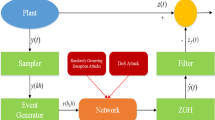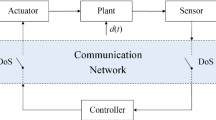Abstract
In this paper, event-triggered state estimation for reaction–diffusion neural networks (RDNNs) subject to Denial-of-Service (DoS) attacks is investigated. A switching-like event-triggered strategy (SETS) is proposed to handle intermittent DoS attacks, meanwhile, alleviate the burden of the network while preserving the accepted performance of the considered systems. Moreover, to obtain the unknown state, the corresponding state estimator of RDNNs is constructed. Furthermore, by virtue of a piecewise Lyapunov–Krasovskii functional method, sufficient conditions are obtained to ensure the exponential stability of the closed-loop systems. Finally, a numerical simulation is provided to demonstrate the feasibility and advantages of the obtained results.








Similar content being viewed by others
Explore related subjects
Discover the latest articles, news and stories from top researchers in related subjects.References
Hjelmfelt A, Ross J (1992) Chemical implementation and thermodynamics of collective neural networks. Proc Natl Acad Sci 89(1):388–391
Yi B, Shen X, Liu H, Zhang Z, Zhang W, Liu S, Xiong N (2019) Deep matrix factorization with implicit feedback embedding for recommendation system. IEEE Trans Ind Inf 15(8):4591–4601
Jin S, Zeng X, Xia F, Huang W, Liu X (2021) Application of deep learning methods in biological networks. Brief Bioinform 22(2):1902–1917
Rajchakit G, Sriraman R (2021) Robust passivity and stability analysis of uncertain complex-valued impulsive neural networks with time-varying delays. Neural Process Lett 53(1):581–606
Wang C, Chen X, Cao J, Qiu J, Liu Y, Luo Y (2020) Neural network-based distributed adaptive pre-assigned finite-time consensus of multiple TCP/AQM networks. IEEE Trans Circuits Syst I Regul Pap 68(1):387–395
Dumas T, Roumy A, Guillemot C (2019) Context-adaptive neural network-based prediction for image compression. IEEE Trans Image Process 29:679–693
Volpert V, Petrovskii S (2009) Reaction-diffusion waves in biology. Phys Life Rev 6(4):267–310
Epstein IR, Xu B (2016) Reaction-diffusion processes at the nano-and microscales. Nat Nanotechnol 11(4):312–319
Shanmugam L, Mani P, Rajan R, Joo YH (2018) Adaptive synchronization of reaction-diffusion neural networks and its application to secure communication. IEEE Trans Cybern 50(3):911–922
Wang L, Jiang S, Ge M, Hu C, Hu J (2021) Finite-/fixed-time synchronization of memristor chaotic systems and image encryption application. IEEE Trans Circ Syst I Regul Pap 68(12):4957–4969
Zhang X, Wu H, Wang J, Liu Z, Li R (2022) Membership-function-dependent fuzzy control of reaction-diffusion memristive neural networks with a finite number of actuators and sensors. Neurocomputing 514:94–100
Wei T, Li X, Stojanovic V (2021) Input-to-state stability of impulsive reaction-diffusion neural networks with infinite distributed delays. Nonlinear Dyn 103(2):1733–1755
Zhou J, Liu Y, Xia J, Wang Z, Arik S (2020) Resilient fault-tolerant anti-synchronization for stochastic delayed reaction-diffusion neural networks with semi-Markov jump parameters. Neural Netw 125:194–204
Zhang X, Han Y, Wu L, Wang Y (2016) State estimation for delayed genetic regulatory networks with reaction-diffusion terms. IEEE Trans Neural Netw Learn Syst 29(2):299–309
Song X, Man J, Song S, Wang Z (2020) State estimation of T-S fuzzy markovian generalized neural networks with reaction-diffusion terms: a time-varying nonfragile proportional retarded sampled-data control scheme. Neural Comput Appl 32(18):14639–14653
Xiong J, Chang X, Park JH, Li Z (2020) Nonfragile fault-tolerant control of suspension systems subject to input quantization and actuator fault. Int J Robust Nonlinear Control 30(16):6720–6743
Tian E, Wang Z, Zou L, Yue D (2019) Chance-constrained \(H_\infty \) control for a class of time-varying systems with stochastic nonlinearities: the finite-horizon case. Automatica 107:296–305
He S, Lyu W, Liu F (2018) Robust \(H_\infty \) sliding mode controller design of a class of time-delayed discrete conic-type nonlinear systems. IEEE Trans Syst Man Cybern: Syst 51(2):885–892
Wang Z, Sun J, Zhang H (2018) Stability analysis of T-S fuzzy control system with sampled-dropouts based on time-varying lyapunov function method. IEEE Trans Syst Man Cybern: Syst 50(7):2566–2577
Zhang X, Han Q, Zhang B (2016) An overview and deep investigation on sampled-data-based event-triggered control and filtering for networked systems. IEEE Trans Ind Inf 13(1):4–16
Lu D, Tong D, Chen Q, Zhou W, Zhou J, Shen S (2021) Exponential synchronization of stochastic neural networks with time-varying delays and lévy noises via event-triggered control. Neural Process Lett 53(3):2175–2196
Sun K, Qiu J, Karimi HR, Fu Y (2020) Event-triggered robust fuzzy adaptive finite-time control of nonlinear systems with prescribed performance. IEEE Trans Fuzzy Syst 29(6):1460–1471
Feng Z, Yang Y, Lam H (2021) Extended-dissipativity-based adaptive event-triggered control for stochastic polynomial fuzzy singular systems. IEEE Trans Fuzzy Syst 30(8):3224–3236
Liu X, Fu H, Liu L (2021) Leader-following mean square consensus of stochastic multi-agent systems via periodically intermittent event-triggered control. Neural Process Lett 53(1):275–298
Li Q, Shen B, Wang Z, Huang T, Luo J (2018) Synchronization control for a class of discrete time-delay complex dynamical networks: a dynamic event-triggered approach. IEEE Trans Cybern 49(5):1979–1986
Wang X, Fei Z, Wang T, Yang L (2020) Dynamic event-triggered actuator fault estimation and accommodation for dynamical systems. Inf Sci 525:119–133
Hu, S., Chen, X., Qiu, J., Zhao, F., Jiang, X., Du, Y.: Dynamic event-triggered bipartite consensus of multi-agent systems with estimator and cooperative-competitive interactions. IEEE Transactions on Circuits and Systems II: Express Briefs (2022) https://doi.org/10.1109/TCSII.2022.3164782
Liu J, Gu Y, Xie X, Yue D, Park JH (2018) Hybrid-driven-based \(H_\infty \) control for networked cascade control systems with actuator saturations and stochastic cyber attacks. IEEE Trans Syst Man Cybern: Syst 49(12):2452–2463
Pan Y, Wu Y, Lam HK (2021) Security-based fuzzy control for nonlinear networked control systems with dos attacks via a resilient event-triggered scheme. IEEE Trans Fuzzy Syst 30(10):4359–4969
Liu J, Yang M, Tian E, Cao J, Fei S (2019) Event-based security control for state-dependent uncertain systems under hybrid-attacks and its application to electronic circuits. IEEE Trans Circ Syst I Regul Pap 66(12):4817–4828
Deng Y, Lu H, Zhou W (2022) Security event-triggered filtering for delayed neural networks under denial-of-service attack and randomly occurring deception attacks. Neural Process Lett 54:5273–5298
Li T, Chen B, Yu L, Zhang W (2020) Active security control approach against DoS attacks in cyber-physical systems. IEEE Trans Autom Control 66(9):4303–4310
Zhang H, Qi Y, Wu J, Fu L, He L (2016) DoS attack energy management against remote state estimation. IEEE Trans Control of Netw Syst 5(1):383–394
Lu A, Yang G (2017) Input-to-state stabilizing control for cyber-physical systems with multiple transmission channels under denial of service. IEEE Trans Autom Control 63(6):1813–1820
Chen X, Wang Y, Hu S (2018) Event-based robust stabilization of uncertain networked control systems under quantization and denial-of-service attacks. Inf Sci 459:369–386
Amini A, Asif A, Mohammadi A, Azarbahram A (2021) Sampled-data dynamic event-triggering control for networked systems subject to DoS attacks. IEEE Trans Netw Sci Eng 8(3):1978–1990
He H, Chen Y, Qi W, Wang M, Chen X (2022) Observer-based resilient control of positive systems with heterogeneous DoS attacks: a Markov model approach. J Franklin Inst 359(1):272–293
Hu S, Yue D, Cheng Z, Tian E, Xie X, Chen X (2020) Co-design of dynamic event-triggered communication scheme and resilient observer-based control under aperiodic DoS attacks. IEEE Trans Cybern 51(9):4591–4601
Liu J, Yin T, Xie X, Tian E, Fei S (2019) Event-triggered state estimation for T-S fuzzy neural networks with stochastic cyber-attacks. Int J Fuzzy Syst 21(2):532–544
Gao X, Deng F, Zeng P, Zhang H (2021) Adaptive neural event-triggered control of networked Markov jump systems under hybrid cyberattacks. IEEE Trans Neural Netw Learn Syst. https://doi.org/10.1109/TNNLS.2021.3105532)
Yue D, Tian E, Han Q (2012) A delay system method for designing event-triggered controllers of networked control systems. IEEE Trans Autom Control 58(2):475–481
Qiu Q, Su H (2021) Sampling-based event-triggered exponential synchronization for reaction-diffusion neural networks. IEEE Trans Neural Netw Learn Syst. https://doi.org/10.1109/TNNLS.2021.3105126
Wang H, Chen X, Wang J (2022) \(H_\infty \) sliding mode control for pdt-switched nonlinear systems under the dynamic event-triggered mechanism. Appl Math Comput 412:126474
Ruan X, Feng J, Xu C, Wang J (2020) Observer-based dynamic event-triggered strategies for leader-following consensus of multi-agent systems with disturbances. IEEE Trans Netw Sci Eng 7(4):3148–3158
Hu S, Yue D, Han Q, Xie X, Chen X, Dou C (2019) Observer-based event-triggered control for networked linear systems subject to denial-of-service attacks. IEEE Trans Cybern 50(5):1952–1964
Liu Y, Wang Z, Liu X (2006) Global exponential stability of generalized recurrent neural networks with discrete and distributed delays. Neural Netw 19(5):667–675
Chen X, Yuan P (2020) Event-triggered generalized dissipative filtering for delayed neural networks under aperiodic DoS jamming attacks. Neurocomputing 400:467–479
Chen X, Wang Y, Hu S (2019) Event-triggered quantized \(H_\infty \) control for networked control systems in the presence of denial-of-service jamming attacks. Nonlinear Anal Hybrid Syst 33:265–281
Liu J, Yang M, Xie X, Peng C, Yan H (2019) Finite-time \(H_\infty \) filtering for state-dependent uncertain systems with event-triggered mechanism and multiple attacks. IEEE Trans Circuits Syst I Regul Pap 67(3):1021–1034
Fridman E, Blighovsky A (2012) Robust sampled-data control of a class of semilinear parabolic systems. Automatica 48(5):826–836
Acknowledgements
This work was supported in part by the National Natural Science Foundation of China under Grants 62203153 and 61976081, in part by the Natural Science Fund for Excellent Young Scholars of Henan Province under Grant 202300410127, in part by Key Scientific Research Projects of Higher Education Institutions in Henan Province under Grant 22A413001, in part by Top Young Talents in Central Plains under Grant Yuzutong (2021) 44, in part by Technology Innovative Teams in University of Henan Province under Grant 23IRTSTHN012, and in part by the Natural Science Fund for Young Scholars of Henan Province under Grant 222300420151, and in part by the Serbian Ministry of Education, Science and Technological Development (No. 451-03-68/2022-14/200108).
Author information
Authors and Affiliations
Corresponding author
Additional information
Publisher's Note
Springer Nature remains neutral with regard to jurisdictional claims in published maps and institutional affiliations.
Rights and permissions
Springer Nature or its licensor (e.g. a society or other partner) holds exclusive rights to this article under a publishing agreement with the author(s) or other rightsholder(s); author self-archiving of the accepted manuscript version of this article is solely governed by the terms of such publishing agreement and applicable law.
About this article
Cite this article
Song, X., Wu, N., Song, S. et al. Switching-Like Event-Triggered State Estimation for Reaction–Diffusion Neural Networks Against DoS Attacks. Neural Process Lett 55, 8997–9018 (2023). https://doi.org/10.1007/s11063-023-11189-1
Accepted:
Published:
Issue Date:
DOI: https://doi.org/10.1007/s11063-023-11189-1




